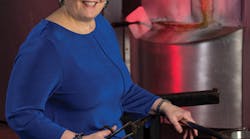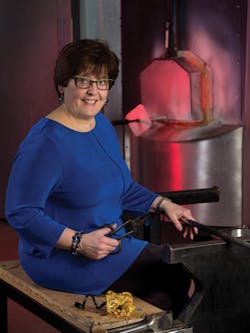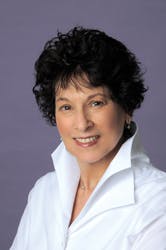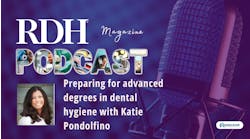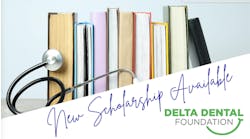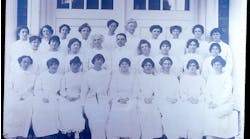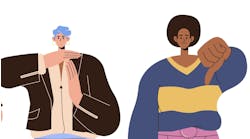Announcing the 2015 Philips / RDH Magazine Mentor of the Year: Elizabeth Tronolone, RDH
Philips Sonicare and RDH magazine proudly honor the 2015 Mentor of the Year — Elizabeth Tronolone, RDH, BS, MOL, of Sylvania, Ohio
Beth Tronolone was always meant to be an educator, she believes, and dental hygiene has been a great pathway to that end. The path started in Bridgeport, Conn., her birthplace and home of the Fones School of Dental Hygiene. Beth, feeling a need to spread her wings, decided to leave Connecticut and go to Marquette University in Milwaukee, Wisc. She had been set on a dental hygiene career since fifth grade, when a hygienist spoke to her class.
-----------------------------------------------------
Articles about previous Mentor of the Year recipients
- Toni Siegrist Adams, RDH, MA
- Eileen Cacioppo, RDH, BLS, MS
- Anne Gwozdek, RDH, BA, MA
- Phebe Blitz, RDH, BS, MS
-----------------------------------------------------
Beth earned a bachelor's degree in dental hygiene in 1980, and was soon on her way to her first position in Indianapolis, Ind. She and her new husband, Bruce, had moved there because of his job in the automotive industry.
Beth has been a member of ADHA since graduation. "Because we moved several times, ADHA membership was a way to find jobs and make friends." She worked at two different offices during the three years they lived in Indianapolis. Through the Indiana Dental Hygienists' Association placement service, she was also lucky enough to be chosen as a tester for Crest.
"It was so exciting," she remembers. "I loved doing research. We were in this tiny little house, doing double-blind studies on Crest Tartar Control toothpaste."
Adventure in Toledo
In the next city, Toledo, Ohio, Beth and Bruce welcomed their daughter Stephanie to the family. "I loved being near the water again, and I considered each move to be an adventure."
Beth worked briefly at Owens Community College as an adjunct clinical instructor. For the Toledo Dental Hygiene Association, she served as newsletter editor, vice president, CE committee chairman, and president. She also worked in private practice.
They moved to Brighton, Mich., next, where Beth found a job at a small dental practice located in a hospital, working for a young dentist who was trying to modernize an older practice he had just purchased.
She remembers, "We went from being an office with one perio probe to being an office that provided nonsurgical periodontal therapy for our patients in need. The transition was a lot of hard work but well worth it."
Stephanie was just three when the family returned to Toledo, where they've lived ever since. "I couldn't get my old hygiene job back," Beth remembers. "I didn't want to sub, so I thought of Owens again and called the director to ask if they had any openings. There were no part-time openings, and I was crushed. 'But,' the director said almost immediately, 'we have a full-time position.' I told her I wasn't qualified for that, but she said, 'Yes, you are.'"
| Turning into an Advocate for Dental Hygiene A new hygienist who graduated from Owens in 2014 was the successful nominator for this year's winner. "Our mentoring relationship is multi-faceted," says Erika Sell of Toledo. "Before I pursued dental hygiene, I was a political science major. Beth saw the potential I have to become a voice like hers, and she motivated me to become a person of action within our association." Both are members of the ODHA government relations committee. "She has also spurred me to become involved in our local component, to educate hygienists about the benefits the association offers. She encourages me to learn more about the ADHA, and to become the voice of the new graduate, a young person looking to evolve the profession. Without Beth, I never would have understood the avenue of advocate for my profession, yet these were goals I had been pursuing for so long. Beth is a hard-working, dedicated individual who motivates me to be the best clinician, educator, and advocate, and to be a voice of evolution for the profession." Erika is an adjunct clinical instructor at Owens, works in private practice two days a week, and is finishing her bachelor's degree at Ferris State University. "I hope my future in advocacy is bright, and that I can continue to serve and learn from Beth, the seasoned hygienist on our committee." |
She was hired as the second-year clinical coordinator. "It was right up my alley," she said, "advanced instrumentation, working with special needs patients and patients with systemic disease, contraindications, and adaptation to care."
Understanding political organizations
Beth worked at Owens for five years as a clinical coordinator, then resigned to help care for a friend with terminal lung cancer. She also worked part-time at a periodontist's office. After her friend passed away, Beth applied to Owens again and was hired as adjunct faculty, but wasn't entirely satisfied with a part-time position.
"A new director came in, Gwen Welling. She had a reputation as a problem-solver for hygiene programs. We learned a lot from Gwen; she helped us into the 21st century." The new director urged Beth repeatedly to get her master's degree, "because you never know. She was dropping big hints, but I didn't even realize it at the time. My daughter was young, so I thought it would be easy to go back to school.
"I enrolled at Lourdes University and earned a master's in organizational leadership in 2007. Stephanie played competitive soccer, and I would sit in the car at her practices, studying or writing papers. I loved it. I was like a little sponge, researching and learning new things."
Almost as soon as Beth began the master's program, Welling left for a job as director of dental hygiene for the Commission on Dental Accreditation (CODA) in Chicago at the American Dental Association.
Despite having just entered the master's program, Beth applied for the job as director of the dental hygiene program, was interviewed, and hired.
"For everything I was learning about organizational leadership in school, I used my faculty as guinea pigs," she said. "Our classes were seven weeks each, and during that time we had to read two books and complete other assignments. I don't know how I did all that work, plus take care of my family, but I managed to juggle a crazy schedule, learn my new job as director, and work on my master's.
"My favorite books from that program are 'Good to Great' by Jim Collins and 'The 360-degree Leader' by John Maxwell. One of the key things I took away from that one was to become a 'go-to player,' meaning that I always try to deliver regardless of the situation. Another gem I learned from Maxwell's teachings is that the key to personal development is being more growth-oriented than goal-oriented. This helps me become better tomorrow than I am today. Part of 360-degree leadership is working with a mentor to keep you grounded and ensure you are completing your goals."
As a program director as well as a teacher, Beth's mentor has been fellow instructor Anne Britt. "We taught together for a number of years. At one time we took students out once a week, to apply fluoride for nursing home patients. I was so sad when she retired; Anne was very encouraging. She encouraged me to pursue my goals, to think about why I was doing things."
Reaching out to community
At Owens, Beth oversees an assisting program and an EFDA program, as well as the hygiene program. The dental hygiene students use experiential learning to develop their responsibility to the underserved.
She said, "In Community class, we teach all of our students about Healthy People 2020, which addresses the lack of access to care. It also talks about simple preventive solutions like fluoride, sealant application, and education, all things a hygienist does. That's how we decided to offer a free day, during the ADA's Give Kids A Smile Day. The students really enjoy giving back to the community.
"The dental hygiene program stresses to the students the need to become an integral part of the healthcare system. This may mean working in a hospital or a public health setting. By doing so, we encourage students to work in settings beyond traditional private practice. It encourages new graduates to work to the top of their license."
Through Give Kids A Smile Day, oral health professionals and students are brought together. Invitation letters are sent to schools in underserved areas, and children are able to have prophies, sealants, and restorations at no cost. The Ohio Dental Association and Henry Schein Dental provide free products for every patient as well.
A small grant from the National Children's Oral Health Foundation also provides free products and educational material. Products are shared with the Dental Center of Northwest Ohio (a stand-alone non-profit dental clinic that provides oral health services for underserved children and adults), where all dental hygiene students participate in clinic sessions providing dental care to underprivileged children.
"During Give Kids A Smile Day, the students, faculty, and I have parents thanking us, teary-eyed, for providing the opportunity for their children. Even though many of the parents work, they cannot afford dental care. There is such a need for access to care that no one seems to be willing to provide on a daily basis ... except a dental hygienist. Unfortunately, the Ohio Dental Practice Act prevents us from working without a dentist's approval of a medical history, followed by an exam, to help the people who most need care."
When Beth's daughter Stephanie was in high school, she had her first experience with helping the underserved. That experience impacted Beth, and has since been embraced by Owens students.
"Stephanie's poverty immersion program, called '4.5', was associated with a group called Servant Leadership. It was a 4½-day program for which students stayed at a downtown church and visited a homeless shelter as guests. The kids were sent in to breakfast and told to sit separately and engage people. One homeless person had been a nurse, but made bad choices with drugs. Stephanie saw how easy it was to fall into a disadvantaged state." At about the same time, Beth participated in a dental mission trip to Chimbote, Peru, with a fellow faculty member, Miriam Armstrong.
As a result of those two experiences, Beth and her faculty decided to give their students the opportunity to help disadvantaged people right in Toledo.
"Janice Darah, the first-year clinic coordinator, added a project for students to distributed mittens and hats, toiletries, and toothbrushes at a Saturday 'Picnic in the Park' organized by the Food For Thought group. The students can see firsthand that if they could provide early care to disadvantaged youth, we could make great strides to reduce decay." Though only first-year students are required to participate in the program, the faculty will sometimes see second-year students working with Food for Thought on their own.
Mentor of DistinctionMarilyn Cortell
In addition to the Mentor of the Year award, Philips Sonicare and RDH frequently choose mentors of distinction. This year, Marilyn Cortell, RDH, MS, FAADH, of New York City is the Mentor of Distinction.
An associate professor in the dental hygiene division at New York City College of Technology, she lectures nationally and internationally on a variety of oral health topics.
She was nominated for the award based on mentoring experiences with Mary Kellerman, RDH, of Billerica, Mass.
Kellerman said, "Marilyn has been an active member of her profession since the 1970s. I first met her as a leader in our Middlesex component where she served also as our Massachusetts Dental Hygienists' Association president in 1989."
Kellerman, who is also a former president of the state association, believes Cor-tell was very influential in advocating membership in Massachusetts and New York dental hygiene associations.
"I remember Marilyn conducting our local component officers' meetings in her home den-room," she said. "She would not only listen to everyone's opinions while knitting a sweater for her sons but could keep us on track with our moving our ideas and actions forward so we would all feel we had a part in our dental hygiene profession."
Cortell is also a Fellow of the American Academy of Dental Hygiene and a consultant member of The Commission on Dental Competency Assessment (formerly known as the NERB).
Kellerman said Cortell is "loved and cherished by many dental hygiene students she has nurtured now for over a decade. It was the time she took and the words she chose to use that made the most impact."
Advocating dental hygiene
The students, says Beth, fully realize the limitations the Dental Practice Act puts on educated individuals not being allowed to do the job for which they've been educated. She is, however, encouraged about the future. "If we could just work to the top of our license, things would be great. The word is getting out. There is change happening nationally as many states take steps to break through these barriers. Smart young people are helping drive the change."
Beth likes to use a quote attributed to Margaret Mead: "Never doubt that a small group of thoughtful, committed citizens can change the world. Indeed, it is the only thing that ever has."
Beth served as president of ODHA in 2012, and since then has served as Ohio ADHA delegate and on the ODHA legislative committee.
"A bill proposed last year, House Bill 463, was eventually passed through compromise and collaboration. Originally, it would have given assistants the right to provide nutritional counseling. Our assisting program doesn't teach nutritional counseling, and I don't know of one that does. We are just starting to educate the legislators about dental professionals. In the past dental hygienists have been left out of that conversation, but we're gaining some strength now with the new generation of hygienists.
"Hygienists and students, working at the grassroots level, have been influential with legislators, demonstrating the lack of standardized education in Ohio for dental assistants, as well as a lack of any nutritional education.
"Fortunately hygienists are now able to decrease the hours of experience a newly licensed dental hygienist needs in order to work when the dentist is not present. The requirement dropped from two years and 3,000 hours to one year and 1,500 hours. Hours have also been reduced for the Ohio Health Access Supervision Program (OHASP) permits. Hygienists also have a loan re-payment program that allows selected new graduates to repay college loans by working in low-income areas. If all Ohio dental hygienists could work in nursing homes or with special needs children, without a tremendous amount of red tape, we would. So many hygienists are passionate about providing care to the underserved and those in need."
Ohio still has work to do, Beth believes, to reduce OHASP restrictions. "And why not let us provide dental screenings? Nurses can, and they don't have the dental training we do. I stayed on the legislative team because of that - because you can really make change. People who need our help don't know enough to advocate for themselves; we're the people who can make things happen."
Motherly advice
Beth feels responsible for the students who pass through Owens to become dental professionals. "We make decisions when we're so young. Sometimes I take students and give them my motherly advice. 'You've got to have passion,' I tell them, 'don't become an ordinary hygienist. Periodontal health is linked to systemic health - to heart disease, diabetes, and pre-term birth. Periodontal debridement and patient education are keys to periodontal health and overall health. It's so much more than polishing. Make sure people know what you can do.'"
It's clear that she acts as a mentor, but Beth doesn't always think of herself in that light. "It was a shock to be named Mentor of the Year. Gail Stoops (senior manager of professional relations) left a message on my answering machine, and all I heard at first was that I'd been nominated. I was blown away just by that. I played the message back twice, and couldn't get my head around the fact that I'd actually been selected as the winner. I started texting people, asking if they'd nominated me. I didn't want to actually say I'd won - I needed to play that message back a few more times first."
Calling herself a mentor might be a little difficult yet, but Beth does realize what students gain from her. "We really have a profound effect on students, as educators. Our faculty talks about that as well. About a third of our hygiene students go back for their bachelor's degrees, and I wish we had more. Encouraging them to complete a bachelor's opens so many doors for them - they can expand their career into business, education, sales, and hospitals.
"I like to help the underdog students. It's important to help them succeed. I remember helping one student, working hard with her to perform well academically. At the end of the year she bought me a little teacher bear statue for my desk. It meant so much to me. I still have it on my window sill."
As an educator, Beth believes in advancing her own knowledge, as well as that of her students. She is looking at the EFDA program for herself, since Owens is about to institute a summer course. "Why not get all the degrees you can? I have OHASP, nitrous oxide, and local anesthetic certification. Who knows, I may even get that PhD some day."
Whatever her future holds, whether she retires in a few years to travel and maybe get back into scuba diving, or whether she stays at her desk until they have to take her out in a wheelchair, Beth will continue to mentor young hygienists and help them in the fight for greater access to care. That fight, she believes, must include more autonomy. "Some professions," she points out, "rule their own destiny. We should too." RDH
Cathy Hester Seckman, RDH, has worked in pediatric dentistry for 12 years. She is a frequent contributor to dental magazines, works part-time as an indexer, and is the author of two novels and more than a dozen short stories.
